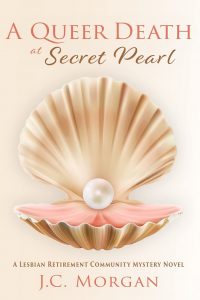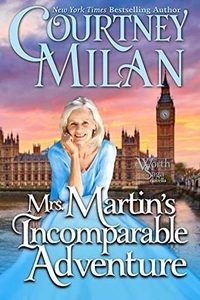I have to admit, “cozy mystery set at a lesbian retirement community” was a tagline I could not resist. A Queer Death at Secret Pearl begins with Judith moving into Secret Pearl and immediately meeting an aggressively welcoming Cynthia, who attempts to take her on a tour, but is so high that she gets them lost until the golf cart battery runs out. The chapters rotate between different point of view characters, most of whom are as eccentric as Cynthia. There’s the “resident slut” whose purpose in retirement is to get all the sex she missed out in her closeted youth, a hypochondriac lamenting her inevitable demise (despite being fit enough to fight off an intruder with a shovel), a grouchy butch who goes by “Wheezer,” and more. Judith is a subdued, bookish retired veterinarian with a collection of abandoned animals she’s taken in–including a vulgar parrot named Hannibird Lector–who is reluctantly pulled into this community’s adventures, and surprises herself by enjoying them.
While there is a mystery element to this, I wouldn’t say it’s the focus. This story is much more about the shenanigans this wacky group gets into, including naked therapy, swimming with manatees, and playing with a ouija board. Oh, and a lot of sex. With the amount of sex talk and sex scenes included, you’d think it would be erotica, but they’re handled in a matter-of-fact way for the most part, not lingered on.
Of course, as the title suggests, there is a death at the beginning of the novella. While a wine and cheese tasting party was underway (which most of the residents found much too fancy and brought beer to instead), Betty was found dead in the bathroom, naked and sitting on a toilet. While this is a retirement community, she was relatively young and healthy, so the women begin to gossip about the possibility of murder, and immediately the taciturn Wheezer is the main suspect–mostly just because she doesn’t get along well with the people accusing her.
I expected this to be a mystery, with Judith investigating, but the death is mostly taken in stride. The coroner’s report is delayed, so no one knows for sure if there is anything suspicious about her death. It’s mostly just a recurring piece of juicy gossip, with people taking stands for or against Wheezer. There are occasional scenes of looking for evidence or puzzling things out, but they aren’t the focus.
This is a short, entertaining read with a lot of humor. It sometimes feels over-the-top in its goofiness (the police especially are cartoonishly incompetent), and there isn’t a lot of space to give most of the characters depth, but it’s light and silly, and I appreciate a story like this because there are so few books about older lesbians, especially ones that embrace sex.
There are two points that grated on me and I think were unnecessary: two characters talk about their “spirit animals,” and another character calls herself a “part time lesbian” and “a little bisexual.” It seems weird to me that the community (especially since it apparently includes hundreds of women, though we just meet a handful) wouldn’t exclude bisexuals or that Brenda wouldn’t just call herself bisexual.
Despite some minor issues I had with it, I really enjoyed reading it, and I’d like to see more stories set at Secret Pearl! I can imagine these characters stumbling into a lot more sticky situations in the future.
This has been a sponsored review. For more information, check out the Lesbrary’s review policy.



